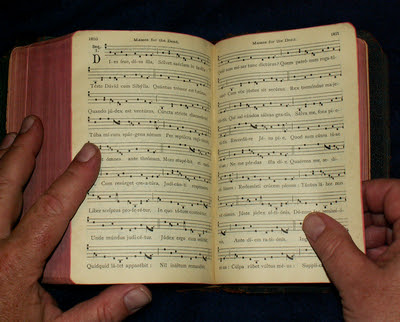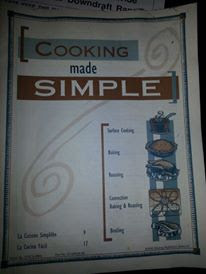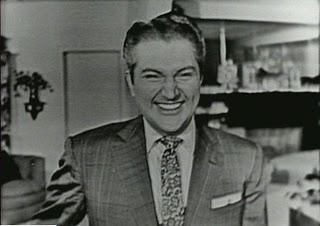the tao of plainchant

Gregorian Day of Wrath, originally uploaded by I, Puzzled.
A couple of weeks ago an old friend of mine, Andy, whom I hadn't seen in years, was in town visiting family and friends. He now lives in West Java with his Indonesian wife and their two young girls. While we were figuring out a time, during his short stay, when we might be able to get together, he mentioned a group of men in the community who gather on Sunday mornings to sing Gregorian chant. Andy was planning to attend, and he invited me to come along.
I learned of this group more than 20 years ago, and had been intrigued ever since. I was delighted that they were still chanting, and still more delighted that I had been invited to participate, and penetrate this inner sanctum of sorts.
As far back as I can remember I have admired the sublime ability of Gregorian chant to invoke calm serenity. When I was in high school I procured a 4-LP Murray Hill* box set of Gregorian chant by mail order. What pure heaven, how soothing to my savage teenage heart!
Okay, I was a weird kid, but there you have it. I'm trying to remember the first time I took notice of Gregorian chant. It was probably as a young child, listening to my father's old recording of Carl Orff's Carmina Burana, particularly the bass aria "Omnia sol temperat", which conveyed some of that mystery and wonder I now associate with the Gregorian chant .
I was also fascinated by the "Dies Irae" theme quoted in many symphonic works, namely Berlioz's Symphonie Fantastique, and Rachmaninoff's Rhapsody on a Theme of Paganini, but it would be years before I heard the original chant.
So, when my friend proposed I join him for this very casual gathering of non-professional singers who just happen to think it's cool to get together and sing Gregorian chant, I thought to myself, I'm a perfect candidate. I even have my own copy of the Liber Usualis!
To quote Wikipedia:
My LP and CD collection has grown to dozens of discs after all these years. I imagine there are many people who think all Gregorian Chant sounds alike, and see no need to own more than one disc. Naturally, I don't agree, as each recording has a distinct quality, there are many approaches and interpretations, and there are many chants with distinct and catchy melodies.
I have learned that many people resist Gregorian and polyphonic liturgical music because of unpleasant associations with a religious upbringing. I am thankfully free of such trappings, as my mother's modest protestant church to which I was dragged was restricted to lackluster hymns, depriving me the glorious masterworks of the great composers and the poetical beauty of sung Latin. I rejected religion and resolutely identified myself as an agnostic by age 12. I rejected religious faith on logical grounds. So, I approach liturgical music with a purely secular aesthetic, even while acknowledging and respecting the religious passion and piety that probably inspired most of it. But I'm wandering far afield from the subject of Gregorian chant.
Once I learned of its existence, I searched doggedly for a copy of the Liber Usualis. At one point I found a copy in a tiny religious book store. The pages were cracked, crumbling, and falling out, and the binding was taped together in a crude unsightly manner. The price of this specimen was $75.00. As much as I wanted it, I wasn't willing to pay that much money for it...though, had it been in good condition, I just might have. My search continued for another couple years.
I repeatedly consulted with the book experts at the larger used bookstore in town. At one point I asked one of the booksellers whether I should be perusing their music section for this particular item, or their religious book section of their fine store. He gave me a condescending look of weary exasperation, and without saying a word, he jumped up from his chair, darted out from behind the counter, and headed downstairs. I had to hurry to keep up with him.
He walked up to a shelf in the religious section, pulled a book down and, without saying a word, shoved it into my arms, leaving me with my triumph as he headed back to his station behind the buyer's counter. Yes, I read the title with giddy disbelieve, Liber Usualis, and though the leather cover was weathered and cracking, the pages were in fine condition.
Then I opened the front cover to see what this treasure would set me back. Written in pencil, $12.50. I gasped and then scurried to the sales counter to make my purchase, completely self-conscious, completely nervous that someone would bar my purchase, this bookstore coup, and tell me that it had been mispriced. Of course, nobody did. I got away with it, and I continue to cherish my dear old Liber Usualis, though I admit to selfish chagrin when reading in that Wikipedia article: "the book has been reprinted and is easily available." Sheesh, now everyone has one!
But now, years later, with this intriguing invitation to a local male-bonding chant jam, I had a legitimate occasion to use it!
However, I'll have to save the account of that singular experience for another blog entry.
I learned of this group more than 20 years ago, and had been intrigued ever since. I was delighted that they were still chanting, and still more delighted that I had been invited to participate, and penetrate this inner sanctum of sorts.
As far back as I can remember I have admired the sublime ability of Gregorian chant to invoke calm serenity. When I was in high school I procured a 4-LP Murray Hill* box set of Gregorian chant by mail order. What pure heaven, how soothing to my savage teenage heart!
Okay, I was a weird kid, but there you have it. I'm trying to remember the first time I took notice of Gregorian chant. It was probably as a young child, listening to my father's old recording of Carl Orff's Carmina Burana, particularly the bass aria "Omnia sol temperat", which conveyed some of that mystery and wonder I now associate with the Gregorian chant .
I was also fascinated by the "Dies Irae" theme quoted in many symphonic works, namely Berlioz's Symphonie Fantastique, and Rachmaninoff's Rhapsody on a Theme of Paganini, but it would be years before I heard the original chant.
So, when my friend proposed I join him for this very casual gathering of non-professional singers who just happen to think it's cool to get together and sing Gregorian chant, I thought to myself, I'm a perfect candidate. I even have my own copy of the Liber Usualis!
To quote Wikipedia:
The Liber Usualis is a book of commonly-used Gregorian chants compiled by the monks of the Abbey of Solesmes in France.
This 1,900-page book contains most versions of the ordinary chants for the Mass (Kyrie, Gloria, Credo, Sanctus, and Agnus Dei), as well as the common chants for the Divine Office (a priest's daily prayers) and for every commonly celebrated feast of the Church Year (including more than two hundred pages for Holy Week alone). The "usual book" or "common book" also contains chants for specific rituals, such as baptisms, weddings, funerals, ordinations, and benediction.All those great tunes! I know them so well from listening to my Gregorian Chant records repeatedly over the years, usually when the stress of life has impelled me to seek it as a means of decompressing. The Liber Usualis also contains detailed instructions about how to read and interpret the neumes and the order of the liturgies, and other good stuff like that.
My LP and CD collection has grown to dozens of discs after all these years. I imagine there are many people who think all Gregorian Chant sounds alike, and see no need to own more than one disc. Naturally, I don't agree, as each recording has a distinct quality, there are many approaches and interpretations, and there are many chants with distinct and catchy melodies.
I have learned that many people resist Gregorian and polyphonic liturgical music because of unpleasant associations with a religious upbringing. I am thankfully free of such trappings, as my mother's modest protestant church to which I was dragged was restricted to lackluster hymns, depriving me the glorious masterworks of the great composers and the poetical beauty of sung Latin. I rejected religion and resolutely identified myself as an agnostic by age 12. I rejected religious faith on logical grounds. So, I approach liturgical music with a purely secular aesthetic, even while acknowledging and respecting the religious passion and piety that probably inspired most of it. But I'm wandering far afield from the subject of Gregorian chant.
Once I learned of its existence, I searched doggedly for a copy of the Liber Usualis. At one point I found a copy in a tiny religious book store. The pages were cracked, crumbling, and falling out, and the binding was taped together in a crude unsightly manner. The price of this specimen was $75.00. As much as I wanted it, I wasn't willing to pay that much money for it...though, had it been in good condition, I just might have. My search continued for another couple years.
I repeatedly consulted with the book experts at the larger used bookstore in town. At one point I asked one of the booksellers whether I should be perusing their music section for this particular item, or their religious book section of their fine store. He gave me a condescending look of weary exasperation, and without saying a word, he jumped up from his chair, darted out from behind the counter, and headed downstairs. I had to hurry to keep up with him.
He walked up to a shelf in the religious section, pulled a book down and, without saying a word, shoved it into my arms, leaving me with my triumph as he headed back to his station behind the buyer's counter. Yes, I read the title with giddy disbelieve, Liber Usualis, and though the leather cover was weathered and cracking, the pages were in fine condition.
Then I opened the front cover to see what this treasure would set me back. Written in pencil, $12.50. I gasped and then scurried to the sales counter to make my purchase, completely self-conscious, completely nervous that someone would bar my purchase, this bookstore coup, and tell me that it had been mispriced. Of course, nobody did. I got away with it, and I continue to cherish my dear old Liber Usualis, though I admit to selfish chagrin when reading in that Wikipedia article: "the book has been reprinted and is easily available." Sheesh, now everyone has one!
But now, years later, with this intriguing invitation to a local male-bonding chant jam, I had a legitimate occasion to use it!
However, I'll have to save the account of that singular experience for another blog entry.
*A budget record label which was an invaluable source of classical music in my youth; at less than a dollar a record, it availed me of, besides Gregorian chant, the complete piano music of Beethoven, Mendelssohn, and Tchaikovsky, all the symphonies and string quartets of Mozart, and much, much more.
- Last 10 movies I watched...
- The Gods Must Be Crazy (1980)
- The Thin Man Goes Home (1944)
- Revenge of the Pink Panther (1978)
- MirrorMask (2005)
- Donnie Darko (2001)
- The Pink Panther (2006)
- Trail of the Pink Panther (1982)
- A Hard Day's Night (1964)
- Song of the Thin Man (1947)
- The Graduate (1967)


Comments
revisiting the plainchant thing.